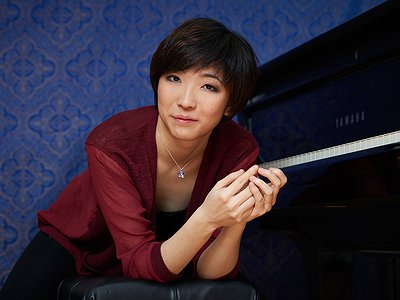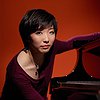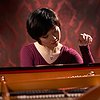Name: Claire Huangci
Nationality: American
Occupation: Pianist
Current Release: Scarlatti – Piano Sonatas on Berlin Classics
If you enjoyed this interview with Claire Huangci, you can find more information about her on her Facebook page, where she interacts with her listeners.
When did you start playing your instrument, and what or who were your early passions and influences?
I got my piano from my parents. It's claimed to be my birthday present, but actually it was really something nice for the new house. It was just something for me and my sisters, neither of whom are pianists. So I started just reading the score by myself and going to a local piano teacher. Really ordinary stuff! There was no great love for it. I remember really hating it sometimes, in fact, because I was not allowed to go outside and play. It was this whole missing out on your childhood story, which a lot of people have also gone through. It was certainly not love at first sight. My parents weren't precisely pushy. But it was this Chinese mentality of never wasting time. So when you're not doing schoolwork or physical exercise even, then go practise the piano. Only when I was 13, I was put inside a class with people who've done this all their life and these people would seriously go on competitions and travel the world. When I was 15, I thought this might be something I might want to do on a permanent basis.
For most artists, originality is first preceded by a phase of learning and, often, emulating others. What was this like for you? How would you describe your own development as an artist and the transition towards your own voice?
I really found myself when I came to Germany. I'd met my current professor Arie Vardi in a competition in Japan. He was a big name and I knew some of his students whom I'd watched play at some competitions. And he invited me to play and I thought it was a good opportunity. I don't regret coming to Hannover, it was the best decision I made.I finally moved out from my parent's house and came over here and suddenly it was really an independent life. It's not so much about finding yourself in music, but finding yourself as a person and knowing what kind of a person you are. And I think I developed a lot of that through independent living and exploring new cities and having freedom.
In terms of originality, I think for me to find this balance, this discipline, you have to know what you want to do. I mean, the life of a musician is free, a little too free perhaps. I mean, say you have two weeks off and then you have a concert a few weeks later, you have to plan yourself so that you stay in shape and the music stays fresh. I mean, all of this is part of finding yourself and finding your own rhythm in life.
Tell me about your instrument, please. How would you describe the relationship with it? What are its most important qualities and how do they influence the musical results – and possibly even your own performance?
When I play, it feels so natural. I've never found that playing the piano is a difficult thing, a chore. I mean, of course, there are technical places that you have to work on a bit. But I enjoy it so much. I feel like it's natural. I guess I'm very lucky to have this dexterity, so that it feels like it's an extension of your body in a way. I don't think I ever have stage freight, it's more this anticipation. And when you're on stage, you just think time moves slower, your mind processes things much faster than the world. It feels like total freedom.
I've called the piano my lifeline. I felt that more when I was younger. You go through a lot of childhood stuff. Things that don't mean much now, but that feel like the world is going to end. I found a way to express myself freely through the piano. A lot of kids sometimes do destructive things, when they're feeling bad. And I've always been able to not have to punch myself, but go to the piano and, without being conscious of it, release my emotions. And I think my parents noticesd that. So even though I thought I didn't like the piano back then, it was already part of me.
My first piano was a Petrof, a Czech piano maker. It was hand made and very beautiful. Rosewood coloured. And it's still in my parent's house. It's definitely been tortured a lot and I haven't played on it for quite some time.
When I was in the States, at the age of 16, I became a Yamaha artist. I was invited to a competition they were sponsoring and they supported me a lot. With the piano first of all, they gave some opportunities, they did some networking. I went to the competition in Japan partially because of them. And that, in turn, lead to me coming to Germany. But there's nothing exclusive about it. I love to play Steinway as well, there are many, many Bösendorfers, Faziolis. And as a pianist, you have to be flexible, because you have to be able to play on any instrument. Only in the biggest can you get a selection. Carnegie Hall, for example. Normally, there'll be a piano there and you have to make the best out of it. No one's going to listen to your excuses. Like: 'It wasn't good, because the piano wasn't good.'
What were some of your main artistic challenges when starting out as an artist and in which way have they changed over the years?
Definitely the technique. I didn't have a good foundation! My first teacher was mainly teaching me about the importance of looking at the music, of studying the score, of following the slurs, the dynamics, really more advanced stuff. And then, when I entered Curtis, I noticed my technique was really way down there. I couldn't play a trill evenly, my scales were not smooth, and I think I really struggled with that for a couple years. And luckily, I was able to hone it up during some solid hours of practise and my teachers were really helpful. They were giving me a lot of exercises, I was living off Czerny, Brahms, a lot of Bach! I mean, Bach was a weekly thing (laughs). Bach is not something where you develop just your fingers. You develop your mind. If you memorise a Bach fugue, it takes a lot more work than the rest of the performance. Whenever I enter a performance, the Bach is always a challenge. It's a relief to finish it! But my early time with his repertoire was really intense. I think I went through all the preludes and fugues! And that's a huge undertaking for anyone.
Today, I guess it's about holding the audience on one line throughout the concert. To tell a story. To show the differences between the eras of classical music, the signature of each composer. To give them something to remember. It's more about the big picture now.
What are some of the most important and influential interpretations to you personally, both live and on recording – and why? Which interpretations have perhaps entirely changed or questioned your perspective on a particular piece of music?
I didn't really go to many live concerts, since we lived in a small suburb outside of Philadelphia. I remember still many recordings that we listened to all the time. Maria João Pires, the Chopin concerto, Martha Argerich, I listened to her debut recording on Deutsche Gramophon all the time. And on a loop. Everytime I was in the car, the same pieces. And I still remember so well the Chopin concerto! The first times I listened to it, this felt like such weird, weird, WEIRD music! I was about 9 or 10 and wasn't playing Chopin at the time, always Mozart. And everytime this theme came on, I was like – Oh no, not again! (laughs) And now, it's absolutely one of my all time favourite concertos. I guess it could be acquired taste, but Murray Perahia, Krysztian Zimmerman, these are still the pianists I admire today.
So recordings always played an important role in my life. When you're young, you don't really know what quality is,. So when you hear something, you think wow, I'm never going to reach that level! And now, I'm online with platforms like Spotify and Qobuz all the time.
In terms of finding my own repertoire: When I was in Curtis for 4 years, I would listen to what other students were playing. When I heard something I liked, I would decide to learn that.
Tell us about your studio/work space, please. What were criteria when setting it up and how does this environment influence the creative process? How important, relatively speaking, are factors like mood, ergonomics, haptics and technology for you?
My workspace … is in school. I don't practise that much! I guess you can say my studio is really my desk with music, my iPod. You spend a lot of time just listening to music. Looking at the score. You can do a lot more than just moving your fingers. I mean, I don't think people are really meant to practise 6,7 hours a day. For some people, it may work really well, but for me, after 3,4 hours maximum, you already lose it, your brain has turned off. The rest is purely mechanical. I think the only time this is important is when you're working on fundamentals and still learning and picking up the technique. Once you're 13,14, your fingers are not going to grow much any more, you should have reached your average level. My life is like, when I'm at the piano, I play classical music and when I listen on my iPod, I try to get a broad sense.




